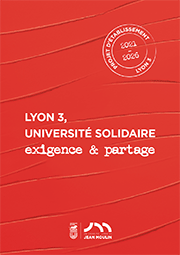AccueilRechercheProgrammes et productions scientifiquesThèsesThèses soutenuesThèses soutenues - 2006-2021Thèses soutenues - 2011
-
Partager cette page
- Recherche,
HUR Nelly
La dignité dans l'exécution des peines privatives de libertés
Publié le 12 septembre 2011 – Mis à jour le 13 septembre 2011
Thèse en Droit - Droit pénal et sciences criminelles sosutenue le 1er juillet 2011
L’analyse de la dignité du condamné dans l’exécution de sa peine privative de liberté suppose d’étudier d’une part les conditions dans lesquelles il exécute sa peine lorsqu’il est incarcéré au sein d’un établissement pénitentiaire, puis d’autre part celles dans lesquelles il exécute sa peine dans la phase post-carcérale. Cependant, la constatation du respect ou de la négation de la dignité du condamné repose sur l’appréciation de l’adaptation et de la proportionnalité de l’atteinte portée à ses spécificités humaines primaires et à leurs supports, à un objectif légitime d’intérêt général.
Ainsi, si l’humanisation des conditions de détention permet d’assurer progressivement le respect de la dignité du condamné, sa responsabilisation et la réappropriation de sa condition humaine lui offrent les moyens de promouvoir sa dignité par la stimulation de ses potentialités humaines d’amélioration. La phase d’exécution post-carcérale de la peine privative de liberté semble connaître un mouvement inverse. En effet, si la conception et la mise en œuvre des mesures d’aménagements de peine semblaient garantir le respect et la promotion de la dignité du condamné, l’introduction « d’une éthique de conviction » de surveillance étatique du condamné dans la phase post-carcérale emporte la négation de la dignité du condamné par une atteinte à son autonomie qui s’avère totalement inadaptée à l’objectif de prévention de la récidive criminologique.
The analysis of the convict's dignity while serving their custodial sentences implies to study the conditions in which they serve their penalties when incarcerated in a prison establishment on the one hand, then the conditions in which they carry out their sentences when out of prison on the other hand. However, if the convict's dignity is respected or negated, it depends in both cases on how the adaptation and proportionality of the infringement of their primary human features are assessed according to a legitimate public interest.
As a result, if more human detention conditions allow to ensure that the convict's dignity is gradually respected, the fact that they are encouraged to bear more responsibility and are again considered human beings enables them to promote their dignity by stimulating their human potential powers of improvement. The post-detention stage (when the custodial sentence is served out of prison) seems to evince an opposite trend. As a matter of fact, if the creation and implementation of measures of sentence reduction seemed to guarantee the respect and the promotion of the convict's dignity, the introduction of a “code of conviction” of state surveillance over the convict in the post-detention stage entails a negation of the convict's dignity as their autonomy has been infringed in a way totally inadapted to the aim of preventing second-offence crime.
Mots clefs : aménagement de peine - condition humaine - dignité – humanisation - incarcération - peine privative de liberté –– phase post-carcérale – prévention de la récidive - responsabilisation – surveillance.
Key-words : measures of sentence reduction/ human condition/ dignity/ humanization/ incarceration/ custodial sentence/ post-detention stage/ prevention of second-offence crime/ to bear responsibility/ surveillance
Directeur de thèse : Annie BEZIZ AYACHE
Membres du jury :
Jean PRADEL, Professeur émérite, Université de Poitiers
David DECHENAUD, Professeur émérite, Université de Grenoble
Annie BEZIZ-AYACHE, Maître de conférences, Université Jean Moulin Lyon 3
Jacques BUISSON, Conseiller à la Cour de Cassation, Professeur, Univ. Jean Moulin Lyon 3
Xavier PIN, Professeur, Université Jean Moulin Lyon 3
Patrick MOUNAUD, Chargé de mission auprès de la Direction de l'Administration pénitentiaire, Paris
Président du jury : Xavier PIN
Mention : Très honorable
Equipe d'accueil : Centre de droit pénal
Ainsi, si l’humanisation des conditions de détention permet d’assurer progressivement le respect de la dignité du condamné, sa responsabilisation et la réappropriation de sa condition humaine lui offrent les moyens de promouvoir sa dignité par la stimulation de ses potentialités humaines d’amélioration. La phase d’exécution post-carcérale de la peine privative de liberté semble connaître un mouvement inverse. En effet, si la conception et la mise en œuvre des mesures d’aménagements de peine semblaient garantir le respect et la promotion de la dignité du condamné, l’introduction « d’une éthique de conviction » de surveillance étatique du condamné dans la phase post-carcérale emporte la négation de la dignité du condamné par une atteinte à son autonomie qui s’avère totalement inadaptée à l’objectif de prévention de la récidive criminologique.
The analysis of the convict's dignity while serving their custodial sentences implies to study the conditions in which they serve their penalties when incarcerated in a prison establishment on the one hand, then the conditions in which they carry out their sentences when out of prison on the other hand. However, if the convict's dignity is respected or negated, it depends in both cases on how the adaptation and proportionality of the infringement of their primary human features are assessed according to a legitimate public interest.
As a result, if more human detention conditions allow to ensure that the convict's dignity is gradually respected, the fact that they are encouraged to bear more responsibility and are again considered human beings enables them to promote their dignity by stimulating their human potential powers of improvement. The post-detention stage (when the custodial sentence is served out of prison) seems to evince an opposite trend. As a matter of fact, if the creation and implementation of measures of sentence reduction seemed to guarantee the respect and the promotion of the convict's dignity, the introduction of a “code of conviction” of state surveillance over the convict in the post-detention stage entails a negation of the convict's dignity as their autonomy has been infringed in a way totally inadapted to the aim of preventing second-offence crime.
Mots clefs : aménagement de peine - condition humaine - dignité – humanisation - incarcération - peine privative de liberté –– phase post-carcérale – prévention de la récidive - responsabilisation – surveillance.
Key-words : measures of sentence reduction/ human condition/ dignity/ humanization/ incarceration/ custodial sentence/ post-detention stage/ prevention of second-offence crime/ to bear responsibility/ surveillance
Directeur de thèse : Annie BEZIZ AYACHE
Membres du jury :
Jean PRADEL, Professeur émérite, Université de Poitiers
David DECHENAUD, Professeur émérite, Université de Grenoble
Annie BEZIZ-AYACHE, Maître de conférences, Université Jean Moulin Lyon 3
Jacques BUISSON, Conseiller à la Cour de Cassation, Professeur, Univ. Jean Moulin Lyon 3
Xavier PIN, Professeur, Université Jean Moulin Lyon 3
Patrick MOUNAUD, Chargé de mission auprès de la Direction de l'Administration pénitentiaire, Paris
Président du jury : Xavier PIN
Mention : Très honorable
Equipe d'accueil : Centre de droit pénal
Documentation
Mise à jour : 13 septembre 2011







